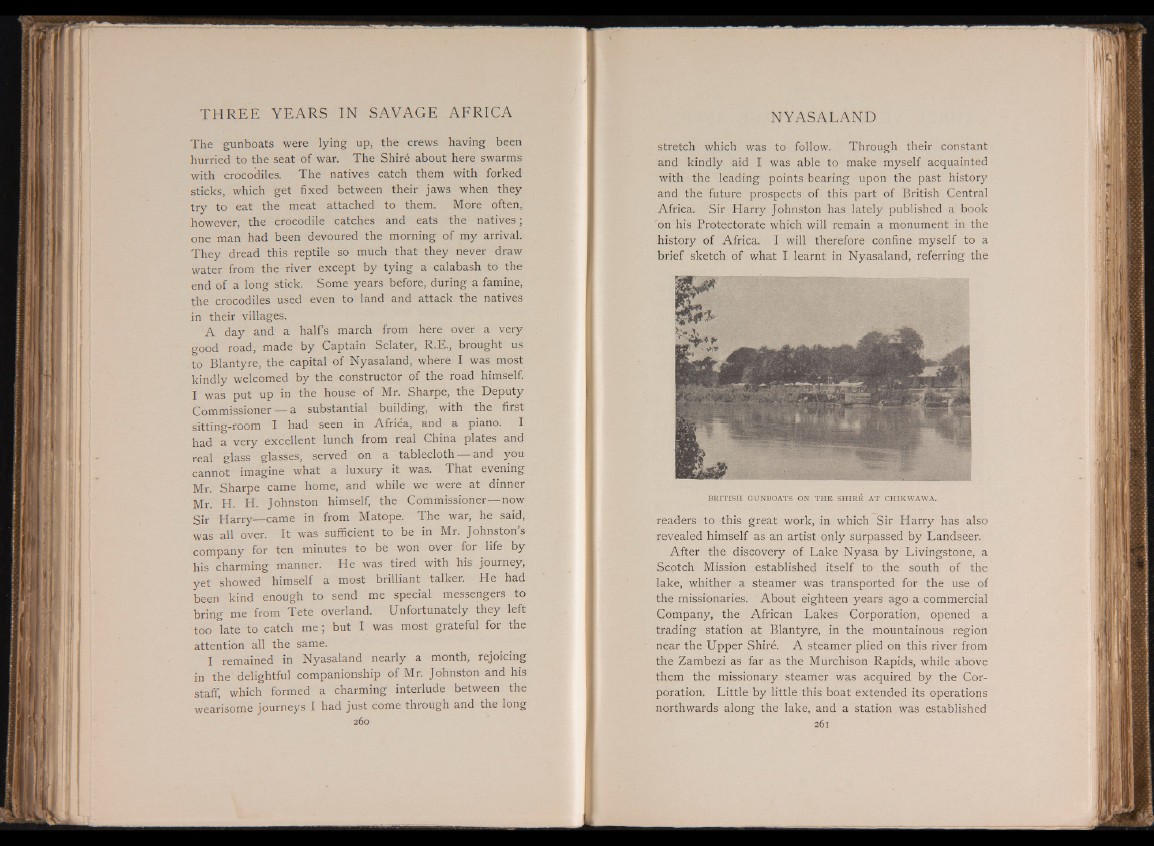
The gunboats were lying up, the crews having been
hurried to the seat of war. The Shird about here swarms
with crocodiles. The natives catch them with forked
sticks, which get fixed between their jaws when they
try to eat the meat attached to them. More often,
however, the crocodile catches and eats the. natives;
one man had been devoured the morning of my arrival.
They dread this reptile so much that they never draw
water from the river except by tying a calabash to the
end of a long stick. Some years before, during a famine,
the crocodiles used even to land and attack the natives
in their villages.
A day and a half’s march from here over a very
good road, made by Captain Sclater, R.L., brought us
to Blantyre, the capital of Nyasaland, where I was most
kindly welcomed by the constructor of the road himself.
I was put up in the house of Mr. Sharpe, the Deputy
Commissioner — a substantial building, with the first
sitting-room I had seen in Africa, and a piano. I
had a very excellent lunch from real China plates and
real glass glasses, served on a tablecloth — and you
cannot imagine what a luxury it was. That evening
Mr. Sharpe came home, and while we were at dinner
Mr. H. H. Johnston himself, the Commissioner—now
Sir Harry—came in from Matope. The war, he said,
was all over. It was sufficient to be in Mr. Johnston’s
company for ten minutes to be won over for life by
his charming manner. He was tired with his journey,
yet showed himself. a most brilliant talker. He had
been kind enough to send me special messengers to
bring me from Tete overland. Unfortunately they left
too late to catch me; but I was most grateful for the
attention all the same.
I remained in Nyasaland nearly a month, rejoicing
in the delightful companionship of Mr. Johnston and his
staff, which formed a charming interlude between the
wearisome journeys I had just come through and the long
260
stretch which was to follow. Through their constant
and kindly aid I was able to make myself acquainted
with the leading points bearing upon the past history
and the future prospects of this part of British Central
Africa. Sir Harry Johnston has lately published a book
on his Protectorate which will remain a monument in the
history of Africa. I will therefore confine myself to a
brief sketch of what I learnt in Nyasaland, referring the
B RIT ISH GUNBOATS ON TH E SH IR É AT CHIKWAWA.
readers to this great work, in which Sir Harry has also
revealed himself as an artist only surpassed by Landseer.
After the discovery of Lake Nyasa by Livingstone, a
Scotch Mission established itself to the south of the
lake, whither a steamer was transported for the use of
the missionaries. About eighteen years ago a commercial
Company, the African Lakes Corporation, opened a
trading station at Blantyre, in the mountainous region
near the Upper Shire. A steamer plied on this river from
the Zambezi as far as the Murchison Rapids, while above
them the missionary steamer was acquired by the Corporation.
Little by little this boat extended its operations
northwards along the lake, and a station was established
261